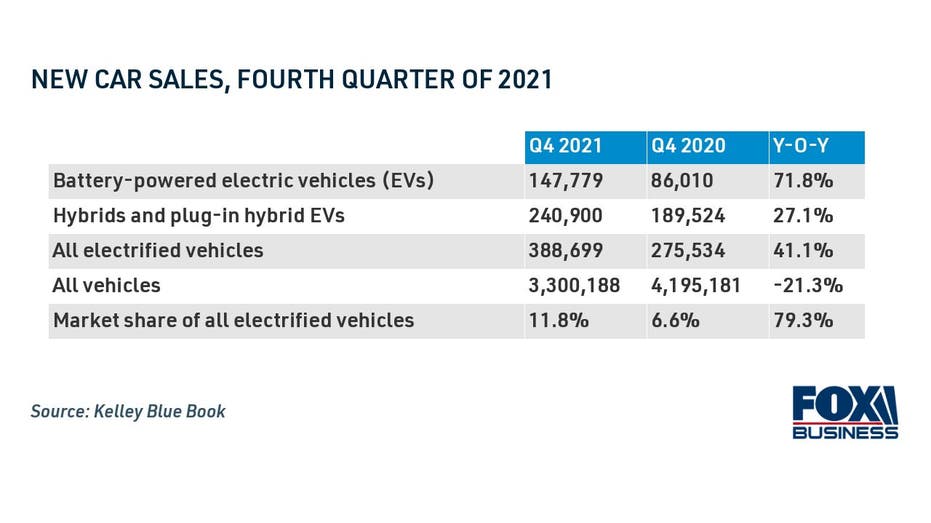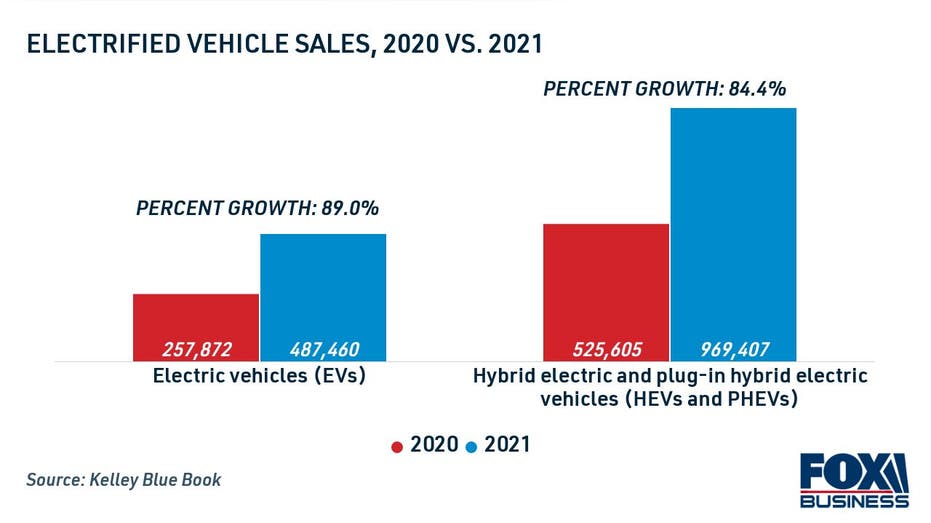Electric vehicle sales hit record high in 2021, KBB reports
Drivers have more options than ever, including EVs and plug-in hybrids

EV sales increased 72% year-over-year, according to KBB, but there are some important costs of EV ownership that drivers should consider. (iStock)
Despite the slow growth in new car sales last year, one type of vehicle is defying the industry-wide trend.
Battery-powered electric vehicles (EVs) saw record-setting growth in the fourth quarter of 2021, with sales jumping 72% year-over-year, according to a new report from Kelley Blue Book. Nearly 150,000 EVs were sold in Q4, and the EV market share was 4.5% — another record for the segment.

"As EV availability expands and capability improves, even more new-car buyers likely will make the choice to buy electrified in 2022," said Matt Degen, editor for KBB.
Keep reading to learn more about the expanding electrified vehicle market, as well as what to consider if you're thinking about purchasing a hybrid or EV. If you're buying a new car in 2022, visit Credible to compare auto insurance rates for free without impacting your credit score.
BUILD BACK BETTER EXPANDS EV TAX CREDIT WITH $12.5K INCENTIVE ON AMERICAN-MADE ELECTRIC CARS
Car buyers have more choices in electrified vehicles
The surge in electrified vehicle sales comes at a time of increased innovation among auto manufacturers. Drivers have more options than ever before if they want to upgrade from a traditional gas-powered car, according to the Department of Energy:
- Battery-powered electric vehicles (EVs) give consumers the freedom to drive without ever visiting the gas station. These cars are powered completely using electricity from a plug-in charging station. Charging availability remains a top concern for buyers considering an EV, KBB said.
- Traditional hybrid electric vehicles (HEVs) are powered by gas as well as electric motors that store energy in batteries, resulting in a high fuel economy and low emissions. Hybrid drivers don't need to rely on EV charging stations.
- Some plug-in hybrid electric vehicles (PHEVs) boast a fuel economy of over 100 miles per gallon (MPG) with all the convenience of gas-powered driving. Think of them as a bridge between EVs and hybrids, as they utilize electricity from a charging station as well as gas from the pump.
Electrified vehicles, including EVs, HEVs and PHEVs, made up 9.7% of the car sales market in 2021, nearly doubling the previous year's rate of 5.4%, according to KBB. And while total auto sales grew just 3.4% from 2020 to 2021, the total sales growth for electrified vehicles increased 85.9% year-over-year.

If you're considering buying an electrified vehicle, it's important to protect your investment with a comprehensive car insurance policy. You can get free auto insurance quotes and find the right policy for your needs by visiting Credible.
DRIVERS IN THIS STATE WILL RECEIVE A $400 CAR INSURANCE REFUND CHECK
The hidden costs of owning an electric car
Electrified vehicles like hybrids and battery-powered EVs may offer better fuel economy, but they're typically more expensive to buy — especially if you purchase a premium model. Plus, there are other long-term expenses to consider, such as maintenance and insurance. Read more about the true cost of ownership below.
- Powering an EV is cheaper, but it requires an electric car charging station
Even with the cost of electricity, powering an EV is about three times cheaper than fueling a gas-powered car.
Charging an EV with 200 miles of range will cost about $9 assuming electricity costs of $0.13 per kilowatt-hour (kWh), the Energy Department estimates. For gasoline-powered vehicles, the national average fuel economy is 25.7 MPG. With the current average gas price at $3.455 as of Feb. 8, according to AAA, it would cost about $27 to drive 200 miles.
It's important to note that EV owners will need to install a home charger outlet, since it would be difficult to rely on public charging stations alone. Home Advisor estimates that the average cost of home charging station installation is between $250 and $1,900, since it will require the services of an electrician.
- EVs have a higher price tag, but may come with tax incentives
Notably, EVs are generally more expensive to buy. The average transaction price across all new vehicles was $45,031 in September 2021, data from KBB shows — while EVs sold for $56,312 on average. That's a difference of about $11,200 upfront.
However, tax rebates from the federal government may make buying an EV more affordable. The current EV tax credit from the Internal Revenue Service (IRS) is between $2,500 and $7,500. The total amount of the federal tax credit depends on the car's kWh battery capacity.
COMPARING CAR INSURANCE QUOTES CAN SAVE YOU HUNDREDS OF DOLLARS PER YEAR
- EV maintenance costs may be cheaper, but insuring an EV can be expensive
Car ownership comes with other operating costs, such as maintenance, tires and repairs. AAA estimates that maintaining an EV is about $330 cheaper annually than maintaining a gas-powered vehicle, since they don't require oil changes or air-filter replacements.
It's also important to factor in the cost of car insurance. Because EVs tend to be more expensive, they can be more costly to insure. However, some car insurance companies offer discounts to drivers with eco-friendly vehicles, according to Young Alfred.
"Your total price might be offset by an insurance discount for an electric vehicle," said Insurance Information Institute spokesperson Janet Ruiz. "You can find online quote comparison tools to get an idea how much it’ll cost to insure an EV in your area."
One way to save money on auto insurance is to compare quotes and policies across multiple companies to ensure you're getting the lowest rate possible for your situation. You can learn more about car insurance and get free quotes on Credible.
THESE ARE THE TOP 10 MOST STOLEN VEHICLES IN AMERICA, REPORT FINDS
Have a finance-related question, but don't know who to ask? Email The Credible Money Expert at moneyexpert@credible.com and your question might be answered by Credible in our Money Expert column.




















